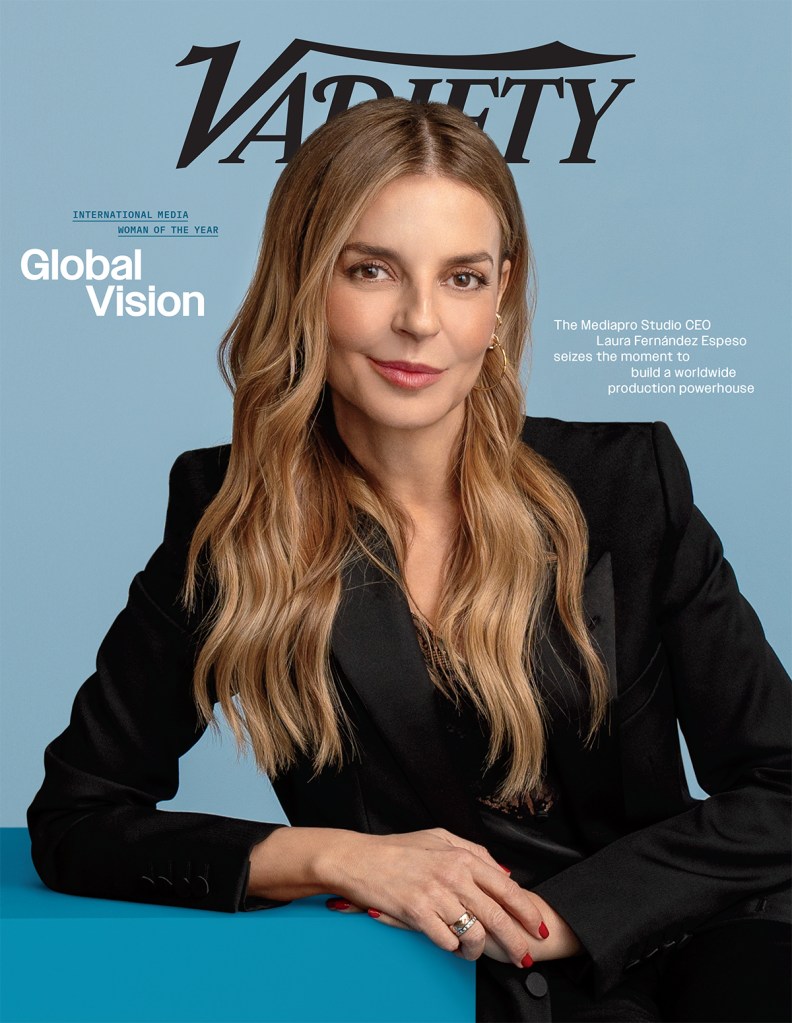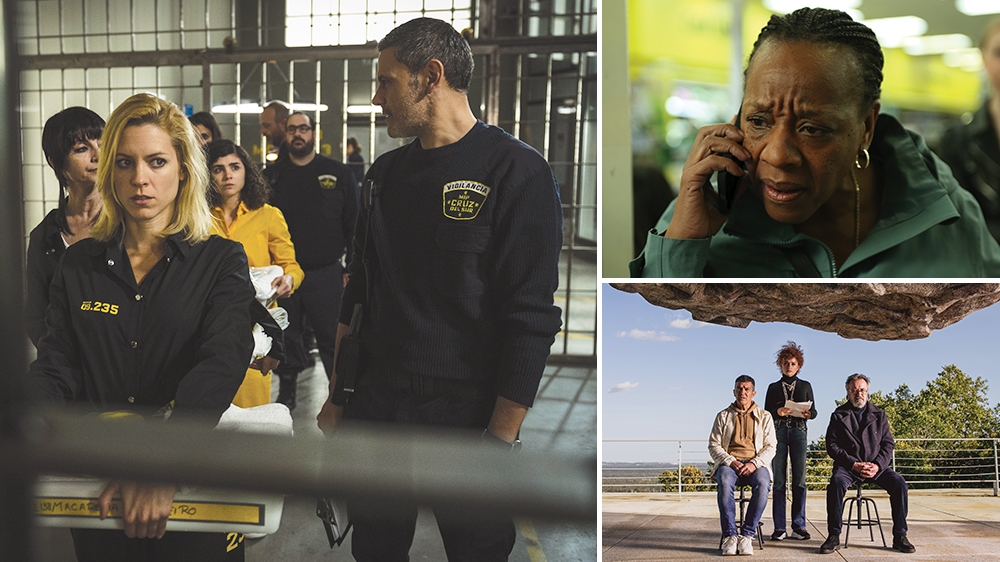Last year, actress Penélope Cruz formed a joint production, Moonlyon, with Madrid-based Mediapro Studio at the request of its CEO, Laura Fernández Espeso, a rising star in Spain’s rapidly expanding media sector.
“It’s been an incredible connection since the primaries,” says Cruz, of her working relationship with Fernández Espeso, Selection’s International Media Girl of the Year.
It came as no surprise to anyone that Cruz chose Fernández Espeso as her partner: boosting female talent in Western Europe and beyond has been a big part of Fernández Espeso’s mission since she took the reins of the bustling production studio five years ago. Along the way, the company, which has 30 factories, has capitalized on the growing demand for TV series that will travel around the world. Fernández Espeso helped the company make its productions more marketable by filming in English. She also sought to broaden her reach across all aspects of Mediapro Studio’s operations by recruiting outside of Spain.

Michael Oats
“One of Laura’s and my main motivations for launching Moonlyon is to provide opportunities for new writers, actors and directors,” says Cruz. “We are also working with a lot of wonderful women, very, very talented, some well-known, some newer. We are very excited about this. Sometimes there are just eight women in a meeting and that makes sense.”
Cruz and Fernández Espeso met when they worked on the 2008 Woody Allen film “Vicky Cristina Barcelona,” produced by Grup Mediapro, the parent company of Mediapro Studio.
Just like Cruz, Fernández Espeso is pushed. At a dinner during the San Sebastian Film Festival in Spain in 2020, many of the government attendees began with small talk. Fernández Espeso, in turn, had a message to deliver. She wanted to immediately publicize Mediapro Studio’s major recent achievement: that the company was selling its “The Head” series territory by territory and would retain 100% of the intellectual property.
“She is a ruler with vision and energy and, at the same time, an excellent human being,” said Pierluigi Gazzolo, CEO of TelevisaUnivision streamer ViX.
Born in a village near Zamora, in western Spain, Fernández Espeso, 52, moved her profession from London to Brussels, from Madrid to Los Angeles and back to Madrid. Now she is one of southern Europe’s rare high-ranking executives, running the global powerhouse behind films like “The Good Boss,” starring Javier Bardem, and backing TV series like Netflix’s “The Young Pope.” , with Jude Law.
If Fernández Espeso’s life were to turn into an origin story, however, it could focus on Brussels, where she worked from her early twenties for nearly six years for two major U.S. multinationals.
“It changed me a lot. My associates and coworkers came from all over the world,” recalls Fernandez Espeso, sitting at the headquarters of Estúdio Mediapro, on the northern outskirts of Madrid, with a wide view of the Guadarrama mountains. “I was with my son there. It adjusts you by starting abroad in another language. It is extremely influential to raise your child in their early years in another culture. You become more flexible and tolerant by being the foreigner.”
This crash course in cultural outreach proved invaluable years later when she arrived at Mediapro. “If you spent the beginning of your career in Brussels in the world and came back to Spain, everyone thinks you know the world. This opened many doors”, says Fernández Espeso.

Mediapro Studio productions include (from left) “Vis a Vis” by Iván Escobar; “Ardua Realidade” by Mike Leigh and “Official Competitors” by Gastón Duprat and Mariano Cohn.
Courtesy of Mediapro Studio
Fernández Espeso outlined a roadmap for progress, helping to expand Mediapro Studio’s activity into new territories, including Uruguay, Canada and China. It has entered into a content production alliance with Turkey’s Medyapim, reflecting its vision that producers of Mediapro Studio’s stature can grow through good co-productions and partnership offerings.
“Laura is exceptionally good at understanding the business needs of media companies in various markets around the world,” says Erik Barmack, former head of global content at Netflix. Mediapro Studio made a fair investment in Los Angeles-based Barmack’s Wild Sheep Content material.
Before joining Mediapro, Fernández Espeso worked in production at Globomedia, the largest producer of scripted series in Spain. When he joined Globomedia in 2009, Spain was doing a roaring trade in collection format offerings. But the global financial crisis sank Spain’s television advertising market. Demand for content dropped almost overnight.
So, in 2011, Globomedia president Daniel Ecija dispatched Fernández Espeso to Los Angeles to explore sales of the TV format and the production of originals. She spent the next three and a half years there.
The timing was fortuitous. When Grup Mediapro bought Globomedia in 2015, the high-quality drama series revolution was taking off, with Mediapro co-producing “The Young Pope”, its first major global series. Ranked as one of the few executives in Spain with real experience working in TV abroad, Fernández Espeso was named director of global content at Grup Mediapro in 2015. As international TV became Mediapro’s biggest source of growth, she was named corporate and TV director at Mediapro Studio was launched in 2019. She was promoted to CEO a year later. On January 1, 2025, she will become general supervisor of Grup Mediapro.
Now, Fernández Espeso is preparing to conquer the North American market in a serious way and will soon launch a first list of titles produced in English in North America.
What are your priorities at The Mediapro Studio?
A very powerful advancement is progress in English-speaking markets such as the US. We should always be able to announce information about this in May. And we prefer to strengthen our operations in Latin America. We are already positioned and producing a lot, but it is still considered one of our main areas of growth. There are more opportunities than ever. Our focus is where we have operations: Mexico, Colombia, Argentina, Uruguay, Chile and the US Spanish-language film/TV market served from Miami.
Its greatest progress was in the global manufacturing of TVs. And the film?
We make about two films a year. Now let’s do lots of extras. There is a huge demand from streaming providers. Some films we produce, others are platform originals, some will premiere in cinemas. We are preparing films in Latin America and more in Spain.

Estúdio Mediapro is responsible for “The Good Boss” by Fernando León de Aranoa (left); “Um Bom Dia” by León de Aranoa (prime); “Countless Nights (bottom left)” by Isabel Coixet and “The Head” by Ran Tellem (bottom right).
Courtesy of Mediapro Studio
You minimize your teeth yourself by working on films by Francis Ford Coppola, Ken Loach and Juan José Campanella.
Of course, as promotion director. When I returned from Brussels, I received big international names. People thought I could be an international administrator. These were the early years of my career, including the release of Francis Ford Coppola’s “Tetro,” which he shot in Buenos Aires and then in Alicante in 2008. I remember him commenting that this was the first time he opened a film session. Photos. for the press.
People associate the takeoff of Spanish TV with “Cash Heist,” which became Netflix’s first global blockbuster in 2018. But of course the revolution began much earlier. A study by The Wit noted that, in 2014, Spain had more format diversifications than any other country in the world. And you were there at the beginning too.
Clear. In 2009, Globomedia was the largest producer of scripted series in Spain, although initially I led cinema. On TV, Globomedia was the pioneer in exports and was very successful before the arrival of Netflix and other streamers. He sold almost his entire collection in more than 150 countries.
Currently, eight of Netflix’s 10 non-English series and films are from Spain. Why do you think Spain has been so profitable?
Spain has spectacular inventive expertise. When I was at Globomedia, I couldn’t help but get in touch with all the creators — Daniel Ecija, Laura Belloso, Alex Pina, Fernando González Molina, Pilar Nadal — a generation of fabulous writers who made collections that traveled the world. We couldn’t compete in prime time with the big budgets and visual effects of the American series, so we wanted to develop the characters more, build a spatial connection through humor.
Are you feeling like you’re raising the glass ceiling?
There are many other women executives who I respect a lot. But in reality, there is still a lot to do when it comes to equality, which is a big concern for me. At Mediapro, I’m working with all the (tools) I have to improve this. I belong to the Mediapro Group outreach committee, a watchdog to monitor compliance with protocols. And it’s really urgent and extremely important for the studio to think hard about the stories that we tell, because we have a responsibility – we reach millions of viewers and viewers. So the questions are: which stories will we select? Who writes, directs and acts in them? What types of characters and what roles do they play?
Mediapro launched a Master screenwriting program in 2019, in partnership with Complutense University of Madrid, ESCAC of Barcelona and then El Labs to collaborate with a new generation of technology working on Twitch, TikTok, podcasts, etc.
All Master collaborators have internships in our productions and more than 50% are currently working in the studio. Coaching is about outreach; It’s really important to have more writers, both men and women, and female lead writers’ rooms. If you are responsible for an organization as large as The Mediapro Studio, which has 30 factories, you have an obligation to contribute to the business, train and improve its professionals.






